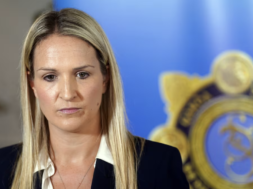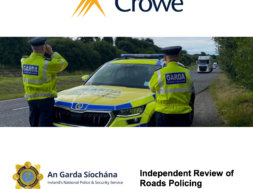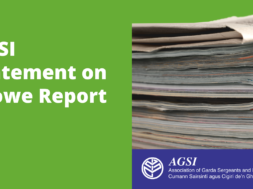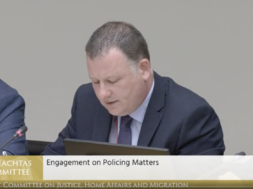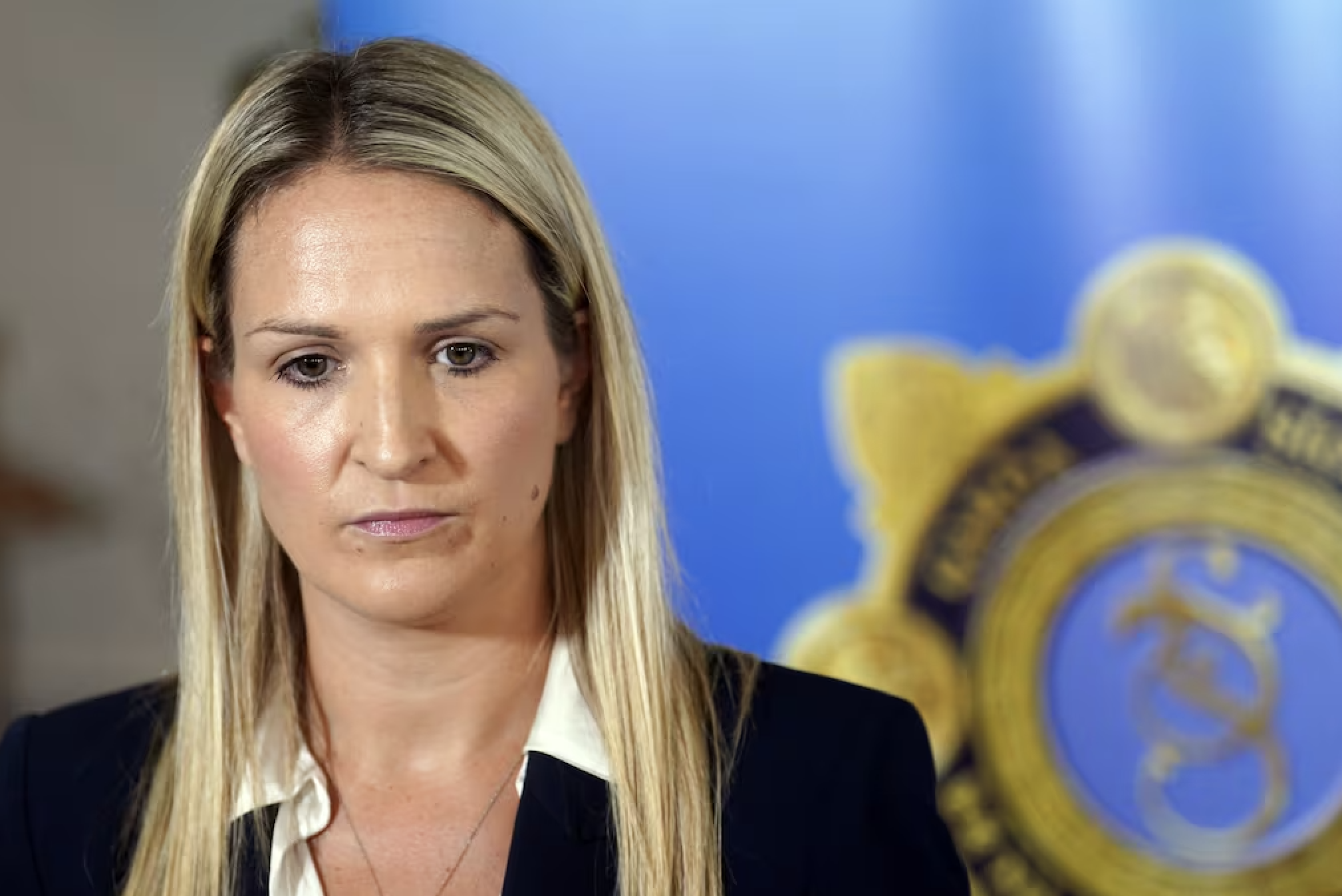
Minister McEntee commences landmark reform of An Garda Síochána and oversight bodies
- Members named to the new Garda Board and the Policing and Community Safety Authority
- Former President of the Court of Appeal, Mr. Justice George Birmingham, designated as the first Independent Examiner of Security Legislation
15 October 2024 issued by the Department of Justice Press Office
The Minister for Justice, Helen McEntee, TD, has announced appointments to the senior roles created under the Policing, Security and Community Safety Act 2024 commencing landmark reform of An Garda Síochána and its oversight bodies.
At its meeting today (Tuesday), the Government designated for appointment the first Chair and members of the new Policing and Community Safety Authority, which amalgamates the current Policing Authority and Garda Inspectorate. The Government also nominated the first Independent Examiner of Security Legislation and noted the nominations to the newly created Garda Board.
Speaking after Cabinet today, Minister McEntee said:
“I am very grateful to all the nominees for their willingness to serve in these important roles. They will bring their extensive experience to this cohesive new framework of governance and oversight for An Garda Síochána as recommended by the Commission on the Future of Policing in Ireland.
“Dr. Elaine Byrne has been designated as the incoming Chair of the Policing and Community Safety Authority. Dr. Byrne is a practising barrister who currently chairs the Policing Authority and will bring continuity of leadership in the newly amalgamated organisation. The members of the PCSA will be Joe Costello; Michael Feehan; Nessa Lynch; Martina Maloney; Freda McKittrick; Tony O’Brien; Ken O’Leary and Emma Reidy.
“I also informed Government colleagues today that Dr. Donal de Buitléir will be designated as Chair of the first Bord an Gharda Síochána. Dr. de Buitléir brings a wealth of experience from the public and private sectors. He has served on the Policing Authority since 2021 and was formerly the Chairman of the Low Pay Commission and a Board member of the HSE. He is eminently well qualified to lead this new Board to enhance and strengthen the internal governance of An Garda Síochána.
“I am also designating for appointment as members of the Board: Catherine Corbett; Helen Faughnan; Anthony Harbinson; Claire Loftus; Sinead McSweeney; Jack Nolan; Michael Patten and Suzanne Treacy. The Board will, through the expertise and external perspective of its members, provide practical support along with robust, constructive challenge to the Garda senior leadership team. It will also strengthen decision making and planning and support the organisation in becoming more agile and adaptive.
“I am pleased to announce that Government has decided to designate Mr. Justice George Birmingham for appointment as the first Independent Examiner of Security Legislation. Judge Birmingham brings a wealth of experience to this important new national security role, having recently retired as President of the Court of Appeal and also served as a judge of the Court of Appeal and the High Court.
“These appointments now complete all the office holders, senior leaders, Board and Authority members required to operationalise the new and reformed policing bodies under the Policing, Security and Community Safety Act 2024 and establish the office of the Independent Examiner of Security Legislation. It is a significant milestone in ensuring we are ready to commence the Act, which I intend to do by way of Order on 16 December.
“I am pleased to see such dedicated and high calibre of individuals being appointed to these key roles and I wish them well as they take up their posts.”
The Board and Authority members were selected through the state boards process run by Public Jobs. As set out in the 2024 Act, to be eligible for appointment as the Independent Examiner, a person must be a serving or retired judge of the High Court, Court of Appeal or Supreme Court. Minister McEntee asked the Attorney General to consult with the Chief Justice to identify a suitable nominee. Mr. Justice Birmingham was identified from this process and is being appointed by Government for a term of 5 years.
The 2024 Act allows the Government and the Minister, as appropriate, to designate persons for appointment to these roles in advance of the commencement of the Act and the establishment of the relevant bodies. This is being done to enable them to assist and contribute in the necessary preparatory work to establish the bodies. They will stand appointed in their roles on the day the Act is commenced on 16 December.
ENDS
Notes for Editors
The Policing, Security and Community Safety Act 2024 was signed into law by the President on 7 February 2024. Since then, an extensive programme of work has been undertaken to enable its commencement in conjunction with the Department’s Programme Partners in An Garda Síochána, GSOC, the Policing Authority and the Garda Síochána Inspectorate.
The Act will come into effect on 16 December.
Policing and Community Safety Authority
Part 4 of the 2024 Act provides for the establishment of the Policing and Community Safety Authority (PCSA), along with the dissolution of the current Policing Authority and the Garda Síochána Inspectorate. The oversight and inspection functions of these two bodies will be broadly merged into the new PCSA. This will strengthen and consolidate independent, external oversight of An Garda Síochána.
The Authority will be responsible for overseeing and assessing in an independent and transparent manner the performance by An Garda Síochána of its function relating to policing services to support the effective provision and continuous improvement of such services to the benefit of the safety of the public. It is also required to keep the Minister informed of developments in respect of matters relating to policing services and to make recommendations to assist the Minister in coordinating and developing policy in that regard.
Biography of Dr Elaine A. Byrne B.L., Chairperson designate.
Dr Elaine Byrne is a practising barrister on the South Eastern and Dublin Circuits with a specialisation in Regulatory Law and Employment Law.
Dr Byrne has served as a member of the Policing Authority since March 2021 and was appointed as Chairperson from 1 January 2024. She has acted as a consultant on governance matters for the European Commission, the United Nations and the World Bank. Her book, “Political Corruption in Ireland 1922-2010: A Crooked Harp,” was published in 2012. She has served as a member of the Hamilton Review Group on Economic Crime and Corruption, and the Seanad Working Group on Reform.
The new members of the PSCA will be:
Joe Costello was a Councillor on Dublin City Council from 2019-2023 and was a member of the Board of the Grangegorman Development Agency and the City of Dublin Education Training Board. He was previously an elected member of the Houses of the Oireachtas (1989-2016).
Michael Feehan is a consultant with the Independent Policing Consultancy since 2017 and was previously Chief Security Officer for the Dublin Airport Authority from 2013-2017. He was previously Assistant Commissioner for the DMR (2009-2012) and Northern Region (2008-2009) in An Garda Síochána.
Nessa Lynch is Matheson lecturer in Law, Innovation and Technology in the School of Law at University College Cork and was previously Academic Director with the Royal New Zealand Police College.
Martina Moloney was County Manager (2003-2014) and was Director of Services (1999-2003) for Galway City Council and County Manager for Louth City Council (2003-2007). She is chair of the Heritage Council since 2021 and chairs the pilot of the Local Community Safety Partnership in Longford.
Freda McKittrick has been the head of Barnardos Guardian ad litem service since 2000 and sits on the Board of the Legal Aid Board. She was previously a senior social worker with Westminster City Council and is a lay member to the Legal Practitioners Disciplinary Tribunal.
Tony O’Brien is the Managing Director & Principal of Global Leadership and Governance Solutions Ltd from 2018, is the Chair of the Board of Safetynet Primary Care since 2022 and was CEO and Director General of the HSE from 2012-2018.
Ken O’Leary was a senior official in the Department of Justice and Equality – Deputy Secretary, Criminal Justice from 2015-2017, and Assistant Secretary Crime and Security Directorate from 2000-2015.
Emma Reidy is the CEO of Aoibhneas Domestic Support for Women and Children since 2013 and also serves as Director for Safe Ireland and is a member of the Legal Aid Board since 2019 and chaired board subcommittees on HR and Strategy matters., chairing the Staff and Human Resources subcommittee.
The publicjobs competition to recruit a CEO for the PCSA has also concluded and Ms. Helen Hall has been selected as the successful candidate. Ms. Hall is the current CEO of the Policing Authority. She will be appointed as the PCSA CEO on its establishment on commencement day.
Bord an Gharda Síochána
The 2024 Act provides for the establishment of Bord an Gharda Síochána (or Garda Board). This will enhance the internal governance of An Garda Síochána by establishing a new non-executive board, which is a corporate governance standard across the public and private sectors.
This enhanced internal governance will:
- allow the new Board, through the expertise and external perspective of its members, to provide practical support along with robust, constructive challenge to the senior leadership team in An Garda Síochána;
- strengthen decision making and planning, and support the organisation in becoming more agile and adaptive; and
- make explicit the roles and responsibilities of the Board and the Garda Commissioner regarding protecting and vindicating the human rights of individuals.
As well as providing strategic support to An Garda Síochána in responding to changes in the ways in which policing will need to be delivered in the coming decades, it will also provide assurance to the Minister around internal governance and risk management. The Board will not have any role in relation to operational matters, as is the case with such boards generally.
The Board is accountable to the Minister for the performance of its functions.
Biography of Dr Donal de Buitleir, Chair designate, Garda Board.
Dr Donal de Buitleir is Chairman of the Professional Standards Board of Chartered Accountants Ireland. He spent the early part of his career in the civil service ending up as Assistant Secretary in the Office of the Revenue Commissioners. He worked for 20 years in the private sector (AIB Group). Since leaving the civil service, he has chaired or been a member of Government Review bodies in the areas of local government, health, education, and taxation and welfare policy. He was Chairman of the Low Pay Commission and a Board member of the Health Service Executive 2005-09.
The other members of the Board will be:
Catherine Corbett was Chief Financial Officer with Deloitte Ireland from 2021 to 2023, and previously Head of Finance with EY (Ernst & Young) from 2015 to 2020. She has been a board member of National Children’s Hospital Foundation since 2014 and as chair since 2017. She is a chartered accountant.
Helen Faughnan was a senior official of the Department of Social Protection – PO from 2004 to 2010, and Assistant Secretary from 2011 to 2018, having served in various civil service roles over her career up until then.
Anthony Harbinson was Permanent Secretary of the NI Department of Agriculture, Environment and Rural Affairs from 2021 to 2022, and Director of Access to Justice / Director of the Northern Ireland Courts and Tribunal Service from 2019 to 2021. He worked as a Director in the NI Department of Justice from 2010-2019 in the Safer Communities, Justice Delivery and Resources areas. He is a current member of the Policing Authority and a qualified accountant.
Claire Loftus worked in the roles of Chief Prosecution Solicitor and as the Director of Public Prosecutions in of the Office of the DPP from 2000 to 2021. She was previously a criminal solicitor with the Chief State Solicitor’s Office for 7 years She was recently appointed as an ordinary member of Cuan (DSGBV).
Sinéad McSweeney was Vice President of Public Policy and Philanthropy with Twitter since 2016. She was Director of Communications with An Garda Síochána from 2007-2012, and Director of Media and Public Relations with the PSNI from 2004 to 2007. She is a member of the board of the Alzheimer Society of Ireland, was a member of the Irish Management Institute. She also worked as Managing Director of Twitter’s international headquarters in Dublin and was a member of its global team.
Jack Nolan was previously Assistant Commissioner in An Garda Síochána from 2011 to 2017, he led the Dublin Metropolitan Region and was Head of both Organisational Development & Strategic Planning and Community Engagement & Public Safety. He has extensive board experience and is engaged as a consultant for DCC on policing and social inclusion issues. He is an expert member of the Global Initiative Against Organised Crime and lectures in Business and Organisational Studies in Trinity College Dublin.
Michael Patten was the Chief Corporate Affairs Director and Chief Environmental, Social and Governance Officer with Glanbia plc from 1995-2003 and 2014-2023. He was Group Corporate Relations Director and the Global Public Affairs Director with Diageo plc from 2004-2014. He is a Non-Executive Director for Irish Management Institute since 2021 and previously for Tirlán DAC (formerly Glanbia Ireland DAC) from 2017-2021.
Suzanne Tracey is Chief Technology Officer with the fibre broadband provider Siro since 2016. She was previously the Transformation Programme Director with Vodafone Group Technology in London from 2014 to 2016. She sits on the Fibre to the Home Council of Europe Board since 2022 and has been a board member with Vodafone Group Services since 2009.
Renumeration – Fees paid to Board and Authority members
The Chair of the Board and the Authority will be paid a fee of €29,888 per annum.
Ordinary members of the Board and Authority will be paid a fee of €14,963 per annum.
It should be noted that in line with the ‘One Person One Salary’ principle, no public servant will be entitled to receive remuneration in the form of board fees, save for situations that are statutorily provided for e.g. Worker Directors.
Travel and Subsistence is paid at Civil Service Rates.
Independent Examiner of Security Legislation
Part 7 of the 2024 Act provides for the establishment of the Independent Examiner of Security Legislation.
The Independent Examiner is an entirely new role and represents a significant development in enhancing Ireland’s national security infrastructure. It provides for the independent review of security legislation and security arrangements. The Independent Examiner will:
- Keep under review the operation and effectiveness of security legislation to ensure that it remains necessary and fit for purpose and contains sufficient safeguards for protecting human rights.
- Have a general examination function in relation to the delivery of security services. State offices and agencies who have a security remit will be obliged to cooperate with the Independent Examiner.
- Review cases where information providers may refuse to provide information to the Police Ombudsman and the Policing and Community Safety Authority (PCSA) on the grounds of security of the State.
The Independent Examiner will assume the existing oversight roles, currently carried out by designated High Court judges, relating to the operation of statutory frameworks for data retention, interception of communications and surveillance following a three month period of transition.
Reporting to the Taoiseach, the Independent Examiner will be supported by an office and will also be empowered to produce other subject matter reports as necessary.
Biography of Mr Justice George Birmingham, Independent Examiner designate
Mr. Justice George Birmingham retired earlier this year as President of the Court of Appeal, having served over six years in that role which is the second most senior position in the Irish judiciary.
Educated at St Paul’s College, Raheny; Trinity College Dublin and the Kings Inns, he was called to the Bar in 1976. He had a successful and broadly based practice at the junior Bar involving a wide range of civil and criminal cases, both prosecuting and defending.
He was a member of Dáil Éireann from 1981-1989 and served as a Minister of State in a number of Government departments from 1982-1987.
Called to the Inner Bar in 1999, his practice was again broadly based but with a particular emphasis on public law and criminal law. As a Senior Counsel he conducted the preliminary enquiry into clerical sexual abuse in the Diocese of Ferns and was the sole member of the Commission of Investigation into the Dean Lyons case.
In 2007 George was appointed a judge of the High Court. There he heard cases across a number of lists including Non-Jury and Judicial Review, Chancery, Personal Injuries, Asylum and Immigration as well as presiding over trials in the Central Criminal Court. In addition, George was responsible for the Minors List.
When the Court of Appeal was established in 2014, George was among the first group of judges appointed and was asked by the President to take day to day charge of the Criminal Division. In 2018 he was appointed as the second president of the Court. In addition to carrying out his administrative responsibilities he presided over cases across the jurisdiction of the Court, principally on the criminal side but also on civil side.
George Birmingham served as the Irish representative on Consultative Council of Judiciary (CCJE) and was elected to the Bureau, the leadership group of that body. He is a former president of the Association of Judges of Ireland (A JI).
Fiosrú – Office of the Police Ombudsman
Under the 2024 Act, GSOC is reconstituted as a reformed police complaints body known as Fiosrú (the Office of the Police Ombudsman) with an expanded remit. The current three Commissioner model is being replaced by a single head of the organisation, the Ombudsman, to be supported by a Deputy Ombudsman and a Chief Executive Officer.
Following an open competition, Cabinet approval on 2 July, and resolutions passed through the Oireachtas on 9 July, Ms. Emily Logan has been nominated by Government for appointment as the first Police Ombudsman under the 2024 Act. The President will formally appoint Ms. Logan as Police Ombudsman on the commencement of the Act. She will be supported in her role by a new Chief Executive Officer, Ms. Sheila McClelland, who was recruited following an open competition run by publicjobs. She has since commenced her role on a designate basis and will also stand appointed when the Act is commenced.
National Office for Community Safety
The National Office will lead the rollout of the Government’s new strategy for improving community safety. Working closely with Local Community Safety Partnerships (LCSPs), the Office will be responsible for providing support, training, and guidance to local authorities to enhance community safety across Ireland. This initiative is a key component of the Government’s broader efforts to promote inter-agency collaboration and inclusive community engagement at the local level.
The publicjobs competition to recruit the Director of the National Office has concluded and Ms. Gráinne Berrill (formerly Coordinator with the Drogheda Implementation Board) has since taken up her role on a designate basis. She will stand appointed when the Act is commenced.
